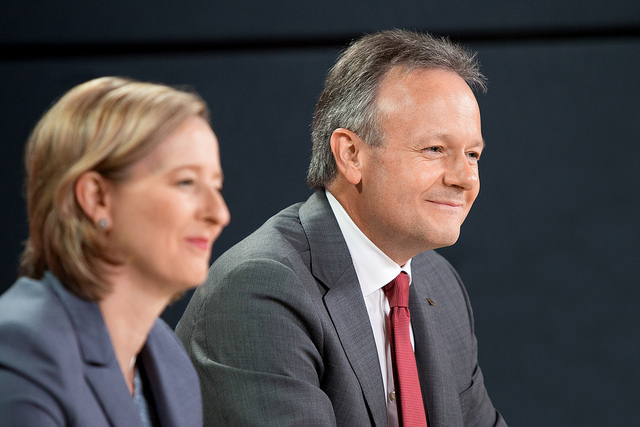Last Tuesday, Governor of the Bank of Canada Stephen Poloz testified in Ottawa in front of the House of Commons Standing Committee on Finance. He had a lot to say about the state of the Canadian economy. But sometimes saying nothing is better.
I want to make clear that I have great respect for Mr. Poloz. His approach to monetary policy in Canada has been rather balanced. He has kept rates low at a time when they should be remaining as low as possible, and he has resisted pressure, and rightly so, to start raising rates. So far, his approach has generally been a very pragmatic one.
Yet, despite being pragmatic, he is also unpredictable, and for a central banker, that can be a recipe for disaster.
Central bankers are powerful individuals. With a few chosen words or sentences, they can send markets into a frenzy. We have seen currencies move in very dramatic ways following statements by central bankers. This is because when they speak, markets listen, and they listen to their every word, trying to decipher possible clues as to the timing of any possible changes in interest rates.
Right now, U.S. observers are obsessing about when Federal Reserve chairman Janet Yellen will be raising interest rates. In June? Sooner? Later? Of course, this is also a source of great concern even in Canada. Every day, someone is giving his or her opinion on the question.
So when central bankers talk, they have an impact and sometimes not the one they were hoping for.
Mr. Poloz has the knack of saying and doing very unpredictable things, thereby leaving markets and pundits scratching their heads. Worse, his remarks are at times contradictory, which undermines his authority.
For instance, a few months ago, against all possible predictions (well, except mine), Mr. Poloz lowered interest rates, catching markets off guard. While I was not surprised, after all the Canadian economy was (and is) not doing well, the markets reacted wildly. In itself, Mr. Poloz’s decision to lower rates was not bad: he made a change that was not expected, and so be it.
The problem, however, is that Mr. Poloz has been on the defensive ever since, going to great lengths at explaining himself and defending his policy, something a central banker should not be doing. In fact, his whole testimony to the House of Commons Committee reads more like a mea culpa, as he explained that he did not intend on frightening or shocking markets.
But his testimony, in my opinion, also raises new red flags.
Recall a few months ago when Mr. Poloz warned us that the Canadian real estate was overvalued by as much as 30 per cent and that a possible correction (read: crisis) may be around the corner? Well, now, it seems Mr. Poloz has changed his tune. Apparently, no such bubble exists in the Canadian real estate: high housing prices are reflecting the fundamentals.
And remember just last month when in an interview with London’s Financial Times, Mr. Poloz described the Canadian economy as “atrocious”? Well now, apparently, apart from the oil industry, it’s “doing well.”
No doubt Mr. Poloz regrets saying the Canadian economy was “atrocious,” and probably wishes he had said it differently. Indeed, he has been on the defensive ever since. Even in front of the Standing Committee, he felt it was necessary to defend himself yet again against the many accusations thrown at him: “What I was trying to describe was that over the case of these first few months, the day-to-day data flow could look quite negative. And we wanted markets to understand that we already believed that the data could be quite poor.”
Mr. Poloz does acknowledge the oil shock will be heavily front-loaded, meaning it will affect the Canadian economy mainly in the first six months of 2015, and then the economy should be performing well as the effects of the oil shock fades.
Yet, it is becoming difficult to take anything Mr. Poloz says seriously. He seems to be saying one thing on Monday, but by Tuesday says something different, and then feels the need to explain himself. It becomes impossible for markets to put faith in his many pronouncements: which ones are we suppose to believe? In (deliberately?) creating uncertainty, Mr. Poloz is creating an even bigger problem.
A central banker that feels the need to defend himself is never a good thing. It leaves the impression of someone who second-guesses himself.
If I were an adviser to Mr. Poloz, I would tell him that it’s time he remains silent.
Observers and pundits will always be guessing and betting against possible interest rate changes. That is part and parcel of our market behaviour. But central bankers should not be feeding the frenzy. Let the data speak for itself, let markets interpret the data, and central bankers should be keeping quiet more often.
Louis-Philippe Rochon is associate professor of economics at Laurentian University and founding co-editor of the Review of Keynesian Economics. Follow him on Twitter @Lprochon




